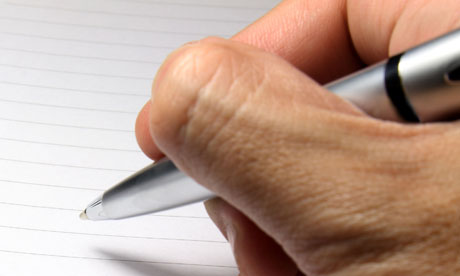You can change the story of your life
It is easy to get stuck into a negative story about your life and who you are, but it is possible change the narrative
 Clare Allan The Guardian,
Clare Allan The Guardian, 
With the right support, you can start a fresh life story.
Photograph: Aki/Alamy
As a writer and reader of fiction, and as a teacher of creative writing, I spend a lot of time thinking about stories. What is a story? What makes a good story? And why are we so bothered about stories anyway?
The essential story form would appear to be etched in our DNA. Hero wants something. Someone or something stops him getting it. He conquers said obstacle, gets what he wants and lives happily ever after. Or doesn't.
The possibilities of this basic form seem genuinely limitless. In a couple of weeks the Man Booker prize judges will announce which of the latest variations appeals to them the best. Thousands will instantly rush out and buy it. And the appetite for stories is not limited to novels. Television, film, computer games; all spew out a constant stream. On doorsteps, at school gates, around water coolers, anywhere people gather, stories are being exchanged.
But most powerful of all are the stories nobody hears. The stories we tell inside our own heads, attempting to make sense of the world and of our place within it. Seldom consciously articulated, they nonetheless have the profoundest effect on how we feel about our lives and even on how we live them.
So what is a story? An account of what happened? As anyone who has written so much as a postcard will readily tell you: it's not that simple. A story is inevitably a selection of certain events. And by the same token an exclusion of others. It's a question of what you focus on. The story of my morning so far could run to hundreds of pages, were I to detail (heaven forbid!) each breath I have drawn, each sip of coffee, each arbitrary, irrelevant thought – and it's still only 8.33.
I've recently been marking novels submitted for a creative writing MA. One of the most common and obvious mistakes committed by apprentice writers (including myself) is to relate conversations, descriptions, scenes, of no relevance to the story. "So why are you telling me this?" you think. "What's the purpose of it?" "Why do I need to know?"
All of which suggests, of course, that a story is far more than just an account of what took place. A story has a purpose; it seeks, in focusing on the particular, to reflect more general truths. A story, be it fact or fiction, simple or dizzyingly complex, is inevitably a demonstration, a statement that this is the way things are. To put it baldly: a story has an agenda.
Which begs the question: what is my agenda? What kind of story am I living in? (Tragicomic, since you ask.) And, most importantly, who is writing it? The stories that we tell ourselves are influenced by many different factors. The culture into which we are born plays a major part, certainly. When I said that a hero wants something, I used the word advisedly; traditionally it is men who want, women get to be wanted. Family culture is central too; beliefs get handed down through generations as surely as sticking-out ears or a beaky nose. And our own life experience, in particular early experience, often establishes a pattern, a theme if you like, from which it can prove very difficult to break free.
Which is fine if that early experience imprints on a child a positive sense of their own possibilities. But difficult or traumatic childhoods can leave adults living out desperate stories, the unconscious agenda of which seems to be to demonstrate the damage done to them. It isn't easy to change one's story, but with the right support it is, I believe, possible. First, we need to recognise the stories we tell ourselves. And then to confront the question: which do I want, to be happy or to be right?
• Clare Allan is an author and writer on mental health issues
The essential story form would appear to be etched in our DNA. Hero wants something. Someone or something stops him getting it. He conquers said obstacle, gets what he wants and lives happily ever after. Or doesn't.
The possibilities of this basic form seem genuinely limitless. In a couple of weeks the Man Booker prize judges will announce which of the latest variations appeals to them the best. Thousands will instantly rush out and buy it. And the appetite for stories is not limited to novels. Television, film, computer games; all spew out a constant stream. On doorsteps, at school gates, around water coolers, anywhere people gather, stories are being exchanged.
But most powerful of all are the stories nobody hears. The stories we tell inside our own heads, attempting to make sense of the world and of our place within it. Seldom consciously articulated, they nonetheless have the profoundest effect on how we feel about our lives and even on how we live them.
So what is a story? An account of what happened? As anyone who has written so much as a postcard will readily tell you: it's not that simple. A story is inevitably a selection of certain events. And by the same token an exclusion of others. It's a question of what you focus on. The story of my morning so far could run to hundreds of pages, were I to detail (heaven forbid!) each breath I have drawn, each sip of coffee, each arbitrary, irrelevant thought – and it's still only 8.33.
I've recently been marking novels submitted for a creative writing MA. One of the most common and obvious mistakes committed by apprentice writers (including myself) is to relate conversations, descriptions, scenes, of no relevance to the story. "So why are you telling me this?" you think. "What's the purpose of it?" "Why do I need to know?"
All of which suggests, of course, that a story is far more than just an account of what took place. A story has a purpose; it seeks, in focusing on the particular, to reflect more general truths. A story, be it fact or fiction, simple or dizzyingly complex, is inevitably a demonstration, a statement that this is the way things are. To put it baldly: a story has an agenda.
Which begs the question: what is my agenda? What kind of story am I living in? (Tragicomic, since you ask.) And, most importantly, who is writing it? The stories that we tell ourselves are influenced by many different factors. The culture into which we are born plays a major part, certainly. When I said that a hero wants something, I used the word advisedly; traditionally it is men who want, women get to be wanted. Family culture is central too; beliefs get handed down through generations as surely as sticking-out ears or a beaky nose. And our own life experience, in particular early experience, often establishes a pattern, a theme if you like, from which it can prove very difficult to break free.
Which is fine if that early experience imprints on a child a positive sense of their own possibilities. But difficult or traumatic childhoods can leave adults living out desperate stories, the unconscious agenda of which seems to be to demonstrate the damage done to them. It isn't easy to change one's story, but with the right support it is, I believe, possible. First, we need to recognise the stories we tell ourselves. And then to confront the question: which do I want, to be happy or to be right?
• Clare Allan is an author and writer on mental health issues

No comments:
Post a Comment